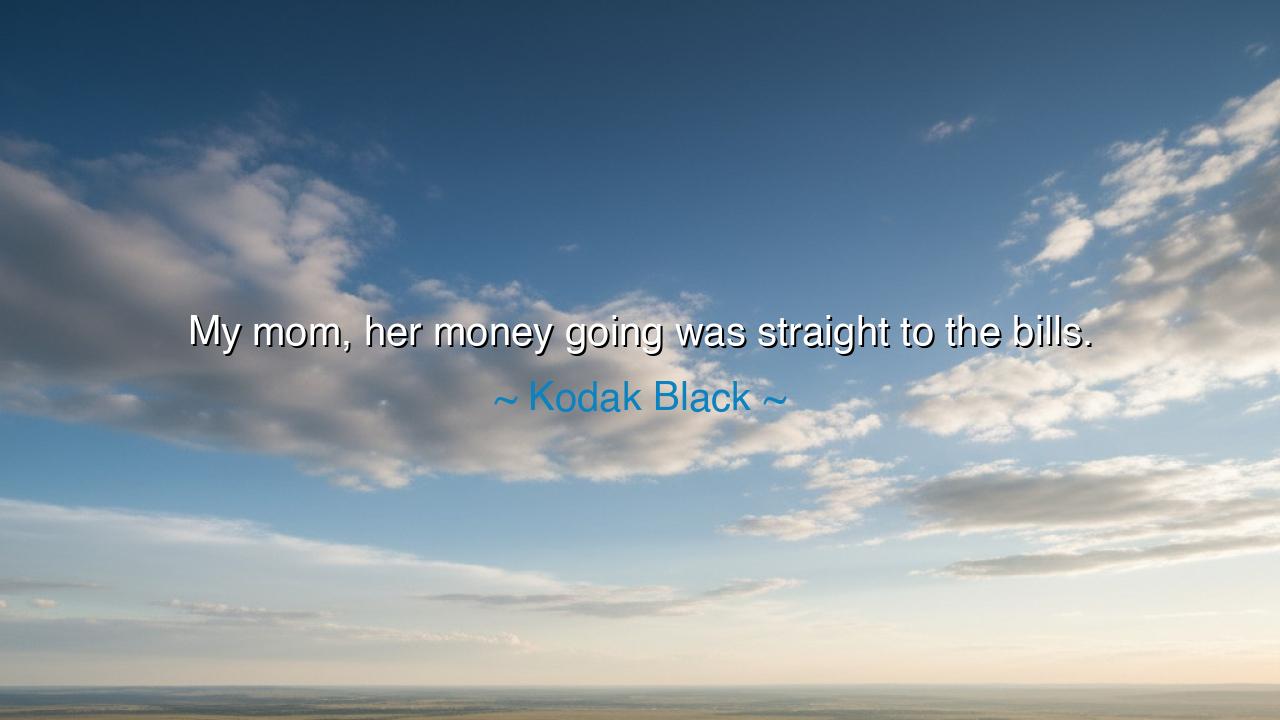
My mom, her money going was straight to the bills.






“My mom, her money going was straight to the bills.” — Kodak Black
In these few raw and honest words, Kodak Black speaks the language of sacrifice — the universal song of the working mother who gives everything and keeps nothing. His statement, stripped of ornament, is pure truth: a portrait of a woman who lived not for luxury, but for love; not for comfort, but for duty. “Her money going was straight to the bills” — that simple rhythm carries the echo of centuries, of all those who have labored so that others might eat, sleep, and dream. It is the cry of the humble warrior, the mother who fights not with sword or armor, but with endurance, with work, with the quiet heroism of survival.
To the ancients, such a woman would have been honored among the matrons and guardians of the hearth, the keepers of civilization’s flame. For in every age, it is the unseen labor of women that sustains the world. Kodak’s mother, like countless before her, bore the weight of necessity upon her shoulders. Her hands may have been tired, her purse small, but her love was vast. Her money — the fruit of her toil — did not build temples or feed vanity; it went to the bills, to the simple things that kept the home alive. She lived not for herself, but for her child, and in doing so, became part of that immortal lineage of mothers whose strength has no monument but memory.
The ancient poets would have sung of her as they did of Penelope, who wove by day and unwove by night to protect her household; or of the Roman mothers who raised sons to defend the republic, their sacrifices buried beneath history’s grander tales. But Kodak, like a modern bard, resurrects this truth in his own tongue — that real nobility lies not in fame or fortune, but in quiet perseverance. The rhythm of his speech carries the music of survival, the poetry of reality. “Her money going straight to the bills” is not mere fact; it is testimony — proof of devotion, of a mother’s unbreakable covenant with her child.
There is also humility in his remembrance. In these words, Kodak Black becomes not a celebrity, but a son — one who remembers what it took for him to stand where he stands. He bears witness to the sacrificial economy of love, in which a mother’s every dollar becomes bread, shelter, warmth. The ancients believed that gratitude was the highest virtue, for it connected mortal hearts to divine truth. By speaking these words, Kodak honors that virtue. He reminds us that behind every success lies an unseen story — someone who gave up their ease so another might rise.
We can see this same spirit in the story of Sojourner Truth, born into slavery but freed by her own hands. She worked tirelessly, her wages spent on the bare necessities of life, yet her spirit burned brighter than the chains that once held her. Like Kodak’s mother, Sojourner’s life was an offering — her strength poured out for others, her toil a song of endurance. Both women, though worlds apart in time and circumstance, share the same sacred truth: that the greatest wealth is not in gold, but in giving.
When Kodak speaks of his mother’s struggle, he is also speaking for a generation — for the children of single mothers, laborers, and dreamers who know what it means to make do, to stretch one dollar into two, to build something out of almost nothing. His words remind us that even in hardship, love transforms scarcity into sufficiency. The ancients taught that the gods favored those who gave generously from what little they had, for that is the highest form of sacrifice. His mother, though her means were few, lived as one of these silent saints of the everyday.
Let this be the lesson for all who hear: remember those who sacrificed for your becoming. Honor them not only with words, but with deeds. Work hard, not for greed, but in gratitude. When fortune smiles upon you, do not forget the hands that held you when you had nothing. For the greatest repayment of love is not wealth returned, but legacy continued — to live with the same strength, humility, and faith that sustained them.
And so, as the ancients would have said: the truest wealth is not what you keep, but what you give. The truest power is not what you wield, but what you endure. And the truest love is not spoken, but lived — in every dollar spent, every night endured, every sacrifice made in silence. Kodak Black’s mother stands among the eternal mothers of history, and her story, like theirs, reminds us that behind every bright future lies a quiet, unshakable love that refused to let the light go out.






AAdministratorAdministrator
Welcome, honored guests. Please leave a comment, we will respond soon